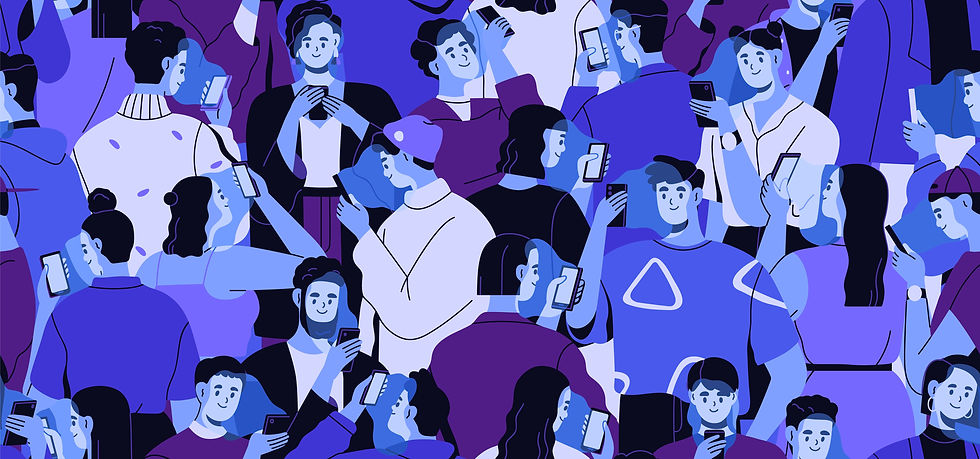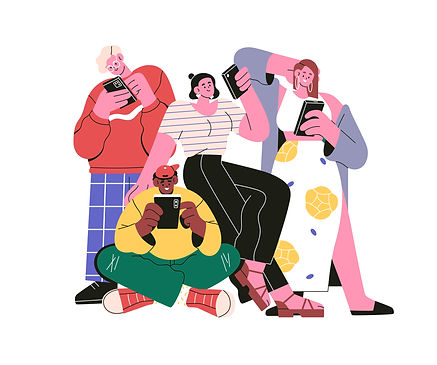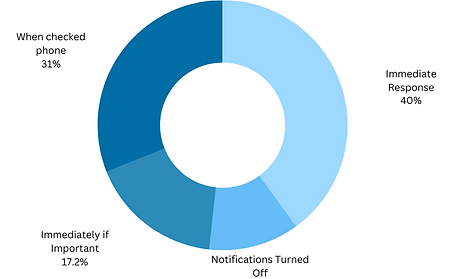DataViz-II

Exploring Social Media Addiction
Addiction Patterns and Their Ramifications
What Is a Social Media Addiction?
Social media addiction is a behavioral addiction that involves an excessive concern about social media to the point where its use begins to impact your health and everyday life.

Nonetheless, in cases of social media addiction, individuals experience an overwhelming compulsion to constantly access and engage with social media platforms.
Excessive utilization of social media has been associated with a range of mental health issues and has the potential to culminate in an addiction to these platforms.
Social Media Usage Patterns
.png)
Frequently Used Platforms
WhatsApp takes the lead, followed closely by YouTube and Instagram, indicating a preference for instant messaging and visual content.
Daily Usage Duration
The extent to which individuals are investing their time in social media, potentially indicating addictive behaviors if the usage duration is consistently high.
.png)
How Many Hours Of Social Media Is Considered Addictive?
No set amount of hours defines a social media addiction.
Determining social media addiction often revolves around assessing the adverse effects it has on an individual and the irresistible urge to use it.
A person may not necessarily spend four consecutive hours every day on social media, but they may constantly be checking it and finding themselves quickly distracted.
Notification Response and Behavior
Understanding how individuals respond to notifications is crucial as it provides insights into their level of attachment and engagement with social media.
.png)
The findings overall suggest a mix of immediate responsiveness, controlled engagement, and habitual checking, which will be further explored in relation to potential social media addiction tendencies.

Addiction Indicators
Addiction indicators are behavioral patterns and tendencies that provide insights into individuals' potential dependency on social media platforms.
57%
people thinks about social media or plans its usage.
57.3%
people feels an increasing compulsion to use social media platforms more frequently.
61.4%
Have tried and failed to reduce their social media use.
Psychological Impact
63.3%
Participants use social media as a means of distraction or escape from personal problems
54.2%
people feel social media use affects their academic or goal-related tasks
Our survey illuminates a distinct connection between the time spent on social media, addiction tendencies, and self-esteem levels. Longer daily usage correlates with heightened addiction risks, while high addiction levels often intertwine with lower self-esteem.
When scrolling on social media, you are consuming the lives of others
Exploring the Interplay Between Social Media Addiction and Self-Esteem
SMA_Score - Social Media Addiction Score
SE Score- Self Esteem Score
Data Source- https://www.kaggle.com/datasets/zaranaramani/analysis-and-reducing-social-media-addiction
Insights
-Strong correlation between addiction and self-esteem levels.
-High daily usage time linked to higher addiction tendencies.
-Addiction might contribute to lower self-esteem.
Conclusion
As daily usage increases, addiction tendencies rise, potentially affecting self-esteem. Striking a balance between digital engagement and well-being is vital to avoid addiction pitfalls and foster a positive self-perception.